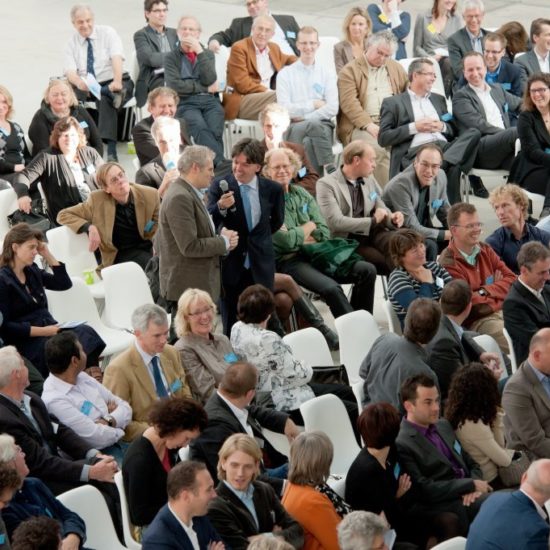Moderation & facilitation - the art of designing and guiding inclusive, participatory conversations - will increasingly become the hallmark of effective leadership in the 21st century. Here's why:
Participation is the New Engagement
For decades, leaders and organizations have focused on capturing attention and 'broadcasting' messages to stakeholders. One-way communication via presentations, speeches, and mass media sufficed when audiences had limited power.
Today, people expect to actively participate, not just listen passively. They want their voices heard and their diverse perspectives incorporated. Moderation skills empower leaders to shape an inclusive, participatory process where stakeholders feel valued as partners, not just recipients.
A 2021 survey by the Harris Poll found that 91% of employees think participation in workplace decisions is essential for engagement, and 88% would be more loyal to companies that consult them on important business decisions.
This demand for participation extends beyond the workplace. A 2022 study by the National League of Cities found that 87% of city councils want to increase public participation in local decision making.
Fluidity Replaces Rigidity
We live in a fluid world marked by complexity, ambiguity, and rapid change. Fixed plans and rigid protocols fail in this landscape. Leaders must cultivate adaptability, comfort with uncertainty, and improvisation skills. Moderation equips leaders to design flexible processes that evolve with participants' input. The focus becomes curating productive conversations and co-creating solutions, not controlling outcomes.
Networks Trump Hierarchy
In today's networked world, influence stems from unleashing collective intelligence, not commanding from the top. Effective leaders cultivate horizontal connections and facilitate teamwork. Moderation helps leaders harness the power of mutual learning, collective wisdom, and synergy across diverse contributors. The moderator role blends guiding with participating, enabling networked action.
A 2022 study by Deloitte found that 36% of the workforce is now involved in dispersed networks within their organization. The study also found network connectedness is now a top predictor of performance.
Empathy and Inclusion Are Non-Negotiable
With rising diversity, empathy and inclusion are essential. Leaders must foster psychological safety, deep listening, and appreciation of different lived experiences. Moderation builds understanding across differences. It ensures all voices are heard by promoting equitable engagement and mitigating bias. This empowers the best ideas to surface.
According to Gallup, companies in the top quartile for ethnic/racial diversity are 35% more likely to have financial returns above their national industry median. Additionally, McKinsey found that companies in the top quartile for gender diversity on executive teams were 25% more likely to have above-average profitability.
Preventing Polarization
In an era of disinformation and tribalism, skillful moderation can counter polarization. By establishing shared purpose and identifying common ground, moderators can nurture mutual understanding between opposing factions. They can also design engagement formats that break people out of like-minded groups and bring together diverse perspectives.
Research shows structured small group conversations and participatory formats increase participants' appreciation of different viewpoints and decrease polarization. Moderators adept at fostering such experiences provide an antidote to divisiveness.
Conclusion
The winds of change are propelling moderation skills to the forefront of effective leadership. Traditional modes of command-and-control, broadcast messaging, rigid planning, and hierarchical relationships are losing resonance. Moderation offers a new model that aligns with 21st century realities - a model marked by participation,co-creation, fluidity, networks, and inclusion. Leadership today requires convening and catalyzing collective intelligence. That's the very essence of skillful moderation.


